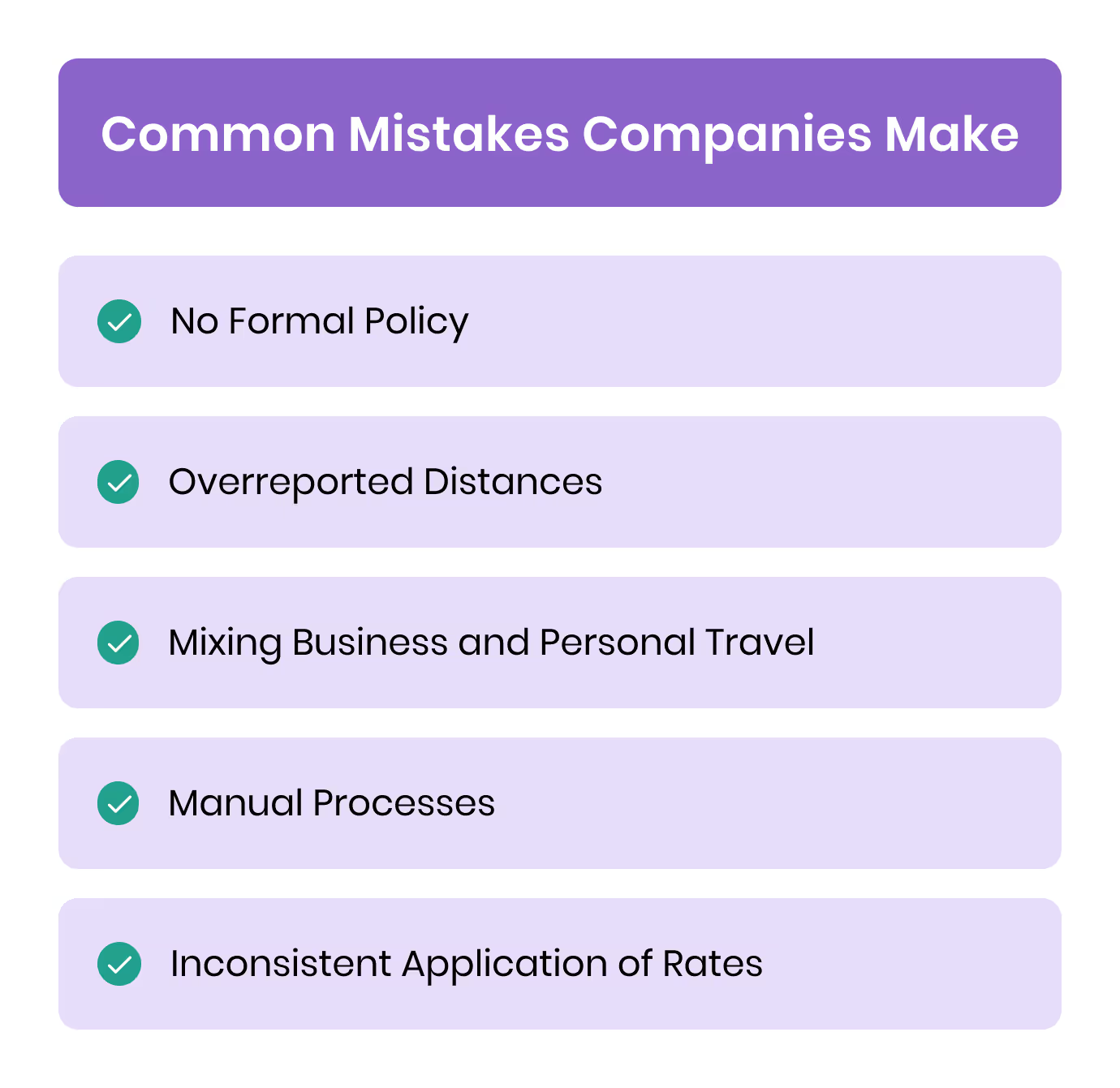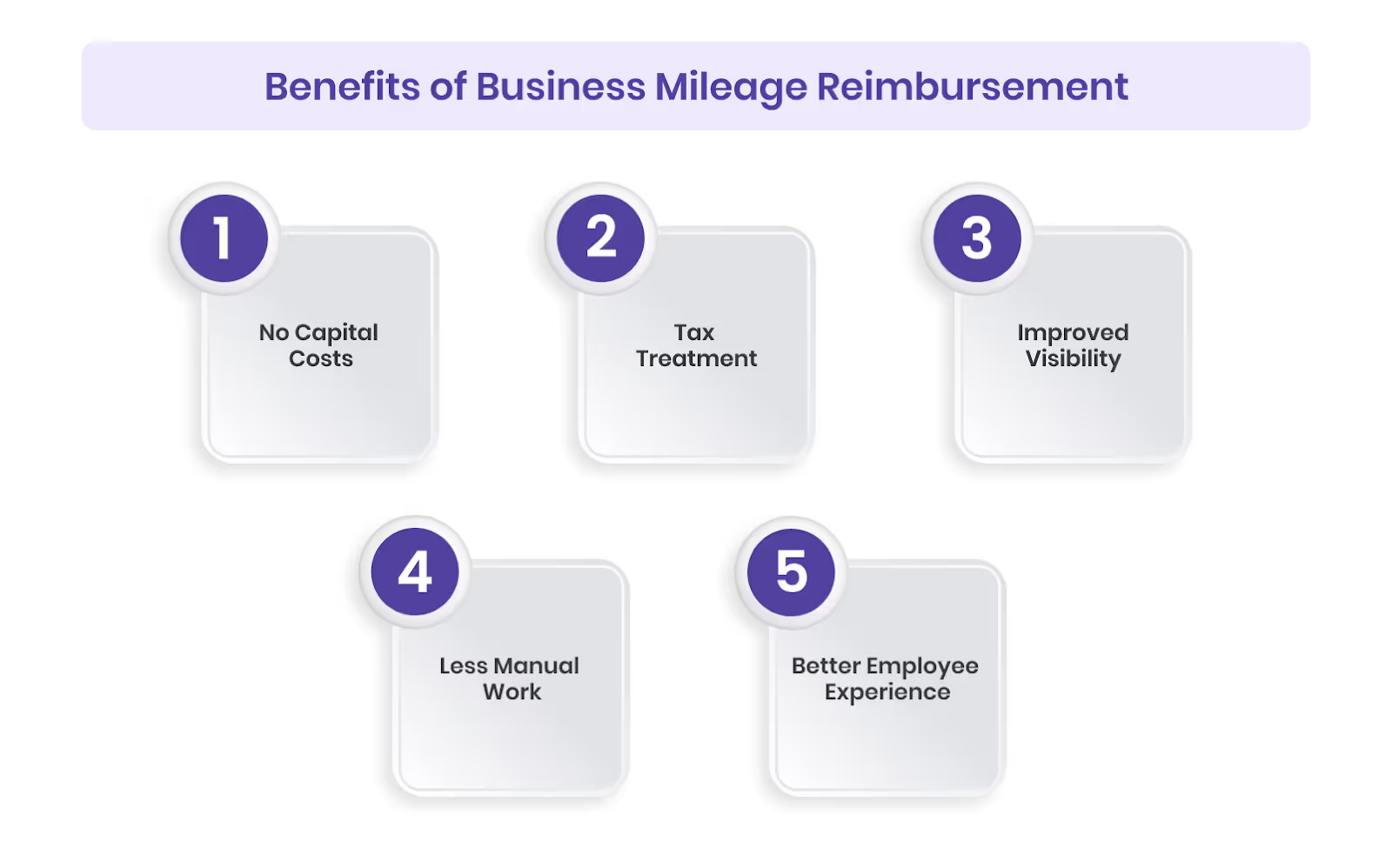Mileage reimbursement is an essential part of employee expense management in the UAE, particularly for businesses with teams regularly travelling between locations. In the absence of a government-mandated mileage rate, organisations are responsible for defining their reimbursement policies.
Reports suggest fuel reimbursement expenses in the UAE rose by 38% in 2022. With increased employee travel, many companies are struggling with inconsistent claims, manual processes, and limited visibility into spending.
This article outlines what mileage reimbursement involves in the UAE, how to calculate it accurately, the common mistakes finance teams encounter, and how platforms like Alaan can simplify and standardise the process.
Key Takeaways:
- Most firms reimburse using a fixed AED/km rate or the actual expense method.
- The UAE has no government-set mileage rate; companies must define their policies.
- Clear policies and automation prevent overreporting, inconsistencies, and delays.
- Effective mileage reimbursement reduces capital costs, supports VAT compliance, and strengthens employee trust.
- Alaan simplifies it with real-time spend tracking, AI receipt matching, VAT automation, and ERP integration.
What is Business Mileage Reimbursement?
Business mileage reimbursement refers to the compensation companies provide to employees who use their personal vehicles for work-related travel. This includes trips taken for business purposes, such as client meetings or inter-office visits, but excludes regular commuting.
The reimbursement is meant to cover the running costs associated with using a private vehicle for work. These may include fuel, routine maintenance, and the general wear and tear caused by business use.
How Business Mileage Reimbursement Works?
Unlike many regulated markets, the UAE does not have a government-mandated mileage reimbursement rate. There is no legal requirement for employers to provide a fixed amount per kilometre, nor is there an official authority that defines how such reimbursements should be calculated.
As a result, it is entirely up to each organisation to decide whether to offer mileage reimbursement, how much to pay, and what method to use. Some companies choose to reimburse based on a fixed rate per kilometre, while others calculate actual expenses using fuel receipts and maintenance records.
Most organisations use one of two methods:
- Fixed rate per kilometre: A flat rate (usually 0.5 to 2 AED/km) is multiplied by the distance travelled for business.
- Actual expenses: Reimbursement is based on fuel and maintenance receipts.
Employees typically submit trip details, and finance teams verify claims before processing. The approach depends on how each company balances accuracy, effort, and control.
How to Calculate Mileage Reimbursement for Employees
The most common approach in the UAE is to multiply the distance travelled by a fixed rate per kilometre. Since there is no government-mandated formula, this method is widely used as a practical standard across companies and expense platforms.
Formula:
Distance (km) × Rate (AED/km) = Reimbursement Amount
For example, if an employee travels 150 km and the approved rate is 1 AED/km, the reimbursement would be:
150 km × 1 AED = 150 AED
Companies may adjust the rate based on the nature of travel, employee role, or vehicle type. Regardless of method, it's important to apply it consistently and document it clearly in the reimbursement policy.
Also Read: Complete Guide to Expense Reimbursement
Common Mistakes Companies Make

Without a standard mileage framework in the UAE, many organisations rely on informal or inconsistent processes. This often leads to errors, disputes, or missed opportunities to control costs. Common issues include:
- No Formal Policy: Some companies approve mileage claims on a case-by-case basis. Without a documented policy, it's difficult to ensure fairness, prevent misuse, or stay audit-ready.
- Overreported Distances: Employees may unintentionally round up or overestimate distances, especially when manual logs or personal estimates are used. Without a clear verification process, this adds up quickly.
- Mixing Business and Personal Travel: Reimbursement requests sometimes include personal detours or non-business-related travel. A lack of detail on the trip purpose and routing makes this hard to catch.
- Manual Processes: Spreadsheets, email approvals, and WhatsApp messages are still used by many teams. This leads to delays, errors, and a lack of centralised tracking.
- Inconsistent Application of Rates: Even when a rate is defined, it may not be applied consistently across departments or roles. This can result in internal disputes and compliance risks.
Avoiding these mistakes starts with a clear policy, proper documentation, and the right tools to enforce both.
Benefits of Business Mileage Reimbursement

Mileage reimbursement, when done correctly, delivers both operational and financial advantages for UAE-based companies:
- No Capital Costs: There's no need to purchase or lease company vehicles. Reimbursing employees for business travel in their cars significantly reduces upfront and ongoing ownership costs.
- Tax Treatment: While the UAE does not have income tax, properly documented mileage reimbursements may still help companies optimise VAT-related claims, especially when business travel expenses are categorised and verified accurately.
- Improved Visibility and Control: Standardised mileage tracking gives finance teams clarity on travel spend across departments, helping with budgeting, cost control, and fraud prevention.
- Less Manual Work: Automation and clear policies reduce reliance on spreadsheets and email trails, freeing up finance teams to focus on strategic tasks.
- Better Employee Experience: Employees are fairly compensated for work-related travel and don't need to worry about fuel or wear-and-tear costs eating into their take-home pay. It also builds trust and transparency.
Tools and Systems to Simplify Mileage Reimbursement
Relying on manual processes to track mileage creates unnecessary delays, inconsistencies, and room for error. UAE businesses are increasingly turning to digital systems to manage mileage reimbursement more efficiently and accurately.
- Expense Management Platforms: These tools allow employees to record travel details, input kilometres, and attach receipts in one place. Finance teams can set standard mileage rates, enforce policies, and review claims centrally.
- Mobile Apps and Web Extensions: GPS-enabled apps and Chrome extensions simplify trip logging, especially for field-based teams. Some platforms calculate distance automatically using mapped routes between starting and ending locations.
- ERP and Accounting Integration: Integrated systems sync approved mileage claims directly with accounting software. This improves accuracy, reduces manual data entry, and supports real-time reconciliation.
- Custom Approval Workflows: Well-defined approval paths help ensure claims follow company policy. Rules can be set by team, role, region, or amount, making the process more efficient and compliant.
Implementing the right tools simplifies claim submission, improves visibility, and supports policy consistency at scale.
Also Read: Fuel Cards and Fleet Solutions for Businesses

How Alaan Supports Mileage and Travel Reimbursements
Alaan is an AI-powered expense management platform built for companies in the Middle East. For teams managing mileage or fuel reimbursements, we bring speed, clarity, and compliance, all in one system.
Instant Transaction Tracking
Every time an employee uses an Alaan corporate card, whether for fuel or tolls, the transaction appears instantly in the dashboard. No waiting for statements or manual entry.
AI-Powered Receipt Matching
Employees can upload receipts via the mobile app or Chrome extension. Alaan Intelligence automatically reads the receipt, extracts key data (like vendor, amount, VAT), and matches it with the corresponding transaction.
Real-Time Visibility and Audit Trails
Finance teams get a full view of all employee expenses, including fuel or travel spend, in one place. Each claim includes a complete audit history, ensuring traceability from submission to approval.
Configurable Approval Workflows
Companies can set up approval flows that match their internal structure. For example, junior employees may need two levels of sign-off, while department heads require just one. All approvals happen in-platform.
Accounting Integrations and VAT Automation
Approved expenses sync automatically with major accounting tools like Xero, QuickBooks, NetSuite, and Microsoft Dynamics. Alaan also extracts VAT information from receipts, helping teams stay compliant with local regulations.
By digitising every step of the process, from card payment to VAT coding, Alaan helps businesses reimburse employees accurately, quickly, and with far less manual work.
Conclusion
Mileage reimbursement may seem like a minor operational detail, but it has a significant impact on employee satisfaction, compliance, and financial visibility. In the UAE, where no standard reimbursement law exists, companies must rely on internal policies, clear processes, and the right systems to manage this effectively.
Alaan makes that simpler. From instant transaction tracking to AI-powered receipt verification and seamless accounting integration, we help finance teams take control of travel and fuel expenses, without the manual overhead.
FAQs
1. Is there a legal mileage reimbursement rate in the UAE?
No. The UAE does not have a government-mandated mileage reimbursement rate. Companies are expected to define internal policies that reflect their operating costs and employee travel needs.
2. What should a standard mileage claim include?
A complete mileage claim should include the date of travel, start and end locations, total kilometres driven, and the business purpose of the trip. Supporting documents such as fuel receipts or GPS logs may also be required.
3. How often should mileage reimbursements be processed?
Best practice is to process reimbursements monthly to ensure timely payouts and accurate accounting. Delays can affect employee morale and complicate record-keeping.
4. Can companies reimburse fuel expenses instead of mileage?
Yes. Some companies in the UAE choose to reimburse actual fuel expenses instead of a per-kilometre rate. However, this approach requires stricter documentation and may be harder to standardise.
5. Does Alaan support mileage tracking directly?
While Alaan does not offer GPS-based mileage tracking, it supports fuel transaction logging, receipt uploads, VAT extraction, and approval workflows—all key components of managing travel-related reimbursements.
6. How can mileage reimbursement affect VAT claims?
If properly documented, fuel and travel expenses can contribute to eligible input VAT claims. Alaan simplifies this by extracting VAT details from receipts and syncing data with your accounting system.


.avif)





.jpg)

